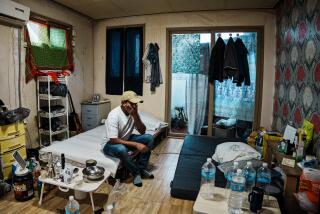Slain S. Koreans Are Returned Home
- Share via
SEOUL — South Korea’s overseas trade association advised companies Monday not to try to work in Iraq for now, as the bodies of two Korean electricians killed in an ambush Nov. 30 near Tikrit were returned home for burial.
Omu Electric Co., the South Korean firm that employed the slain workers, also said Monday that it was withdrawing its remaining 60 employees from Iraq.
“Please don’t make visits here for the time being,” Kim Kyu Shik, the Baghdad director of the Korea Trade Investment Promotion Agency, told South Korea’s semiofficial Yonhap news agency in an open warning. “You don’t need to risk your life at this critical point.”
Choi Dong Seok, an official in the trade organization’s Seoul office, added: “Korean companies have a lot of experience in engineering and infrastructure work all over the Middle East. But for Iraq, now the risk for terror attacks is too high.”
If the admonition leads to an exodus, this is sure to further complicate the efforts of the U.S.-led occupation to repair Iraq’s battered infrastructure. Omu Electric was fixing electric lines and building a transmission tower near Tikrit under a subcontract to Washington Group International of Boise, Idaho, which has a $110-million contract for power-grid repairs.
The killing of the electricians has galvanized public opinion in South Korea against a similar promise by President Roh Moo Hyun to send 3,000 troops to Iraq. There are about 465 South Korean medics and engineers working near Nasiriyah.
The grieving 18-year-old daughter of one of the men posted an open letter last week on the president’s Web site charging that the South Koreans were targeted because of plans to send troops.
“Frankly, I think my father was a scapegoat for our country,” wrote Kim Young Jin, the daughter of Kim Man Soo, 45.
The bodies of Kim and his co-worker Kwak Kyung Hae, 60, arrived Monday night at South Korea’s Incheon International Airport, where a brief memorial service was held.
Other Iraqi-based workers from Omu Electric reportedly staged a weeklong strike to demand that they be evacuated and that managers issue a written apology for the deaths. According to the Washington Post, the workers had not been supplied with bulletproof vests or armed guards, common precautions for working in Iraq.
More to Read
Sign up for Essential California
The most important California stories and recommendations in your inbox every morning.
You may occasionally receive promotional content from the Los Angeles Times.









